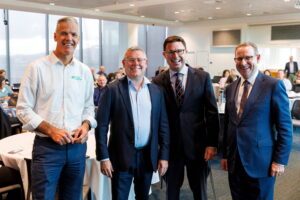Agrifood Workforce Summit: What is the Plan?
Australian Agriculture and the supporting industries are under immense pressure from workforce shortages. This is not a new issue, but has risen to new levels in recent years so industries are screaming for a strategy, a plan, or something that will give them reprieve from a constant rising tide.
In a country that has 72% of agricultural produce available for export it would come as a surprise to say that Australia is recognised as a food insecure nation by the UN since as early as 2018, due to the prevalence of natural disasters and supply chain issues. FoodBank statistics now show that over 2 million households in Australia (21%) experience food insecurity weekly – a statistic that is only continuing to worsen…
These issues, along with many other affecting the agricultural industry were explored by over 100 people at the Agrifood Workforce Summit held by National Farmers Federation and the Australian Chamber of Commerce and Industry on 27 April at QUT, Brisbane. I was fortunate to attend as a representative of the Future Farmers Network and MLA, and observed several high-profile panellists of agribusiness, agri-political, and transport related experts, including the Hon. Murray Watt, and the Hon. David Littleproud, discuss a myriad of topics pertaining to workforce challenges along the supply chain.
Significantly, the key topics which resonated with me were education, long term visas, and the need for holistic industry collaboration.
Education spans the whole supply chain and can be used quite loosely when talking about agrifood workforce. Education not only refers to the upskilling within a business through short courses or training, but also looks more deeply at our whole school curriculum and the lack of support for agriculture and the supporting industries.
Scott Graham, teacher at Barker Collage has developed a comprehensive agricultural program that has the largest number of agriculture graduates compared to other schools. However, as great as this is, we could all agree that one internal “Ag” champion in one school isn’t going to provide widespread education to bring new skilled labour into Agriculture.
Call it coincidental or well planned, but on the same day as the Agrifood Workforce Summit where visas were a topical point of discussion, Minister for Home Affairs Claire O’Neil announced an overhaul to the “broken” migration system. A theme reiterated through the day was there is too much reliance on temporary visas, which turnover potential skilled labour far too quickly and result in both a skills and workforce deficit. Couple that with a system that highlights Australia as an unattractive destination for migrants and the Agricultural industry loses out. I agreed with many panellists and attendees at the Summit that long term skilled and non-skilled pathway for migrants with an efficient system for reviewing visas will be a good step to provide more consistent workforce.
Lastly, it is well known that silos in government, within agricultural sectors, and between different industries result in long term challenges, and slows progression of solving cross sectoral and industry issues – which is all too heightened by workforce labour shortage and supply chain logistic contracts contributing significantly to the level of food insecurity in Australia. This reality generated interesting discussion and agreement in the audience, with Minister Hon. Murray Watt stating that the Department of Agriculture will collaborate with other departments on this issue.
However, given the nature of the discussions at the Summit between industry leaders, I’m not sure that the Agricultural industry has time to wait for government to collaborate. Indeed, I agree with many that progressing with a cross sectoral group of RDCs to spearhead discussions around solving some of these challenges collaboratively is a priority. A solid starting point to what could be a very successful working group. But it shouldn’t just be up to industry to take ownership, government drive and support in collaboration with industry is what is needed.
Author: Will Atkinson, FFN Director and MSA Business Development Officer at Meat & Livestock Australia.
Photo: Left to Right, Tony Maher, CEO National Farmers Federation; Hon.Murray Watt, Minister for Agriculture, Fisheries and Forestry; Hon. David Littleproud, Shadow Minister for Agriculture; Andrew McKellar, CEO Australian Chamber of Commerce and Industry (ACCI). Credit ACCI.
